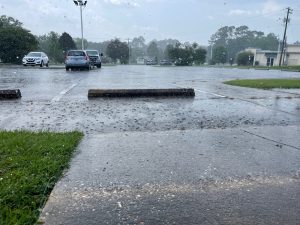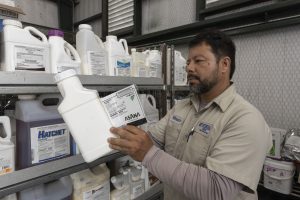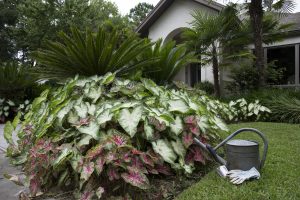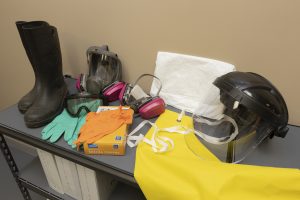
During rainstorms, pollutants from yards and roads are picked up and flow downstream. Photo credit: Carrie Stevenson, UF IFAS Extension
In most Florida waterways, stormwater runoff is the primary source of pollution. If you think about what gets washed down the drain during a typical rainstorm, it may include anything from trash and construction dirt to oils, gasoline, and chemicals from surrounding lawns.

A lawn care professional reading the safety and instruction labels of agriculture-based pesticides and fertilizers. Photo credit: Tyler Jones, UF IFAS
Pesticides were first regulated at a national level in 1947, with the passing of the Federal Insecticide, Fungicide, and Rodenticide Act (FIFRA). In the early 1970’s, more regulations were put in place at national and state levels. There are specific instructions for use on every bag of insecticide or fungicide sold—a concept we refer to as, “the label is the law”—which homeowners are bound to follow if using own their own yard. But if someone has a professional business where they apply pesticides to yards, golf courses, or other athletic fields, they must have a license to do so. These pesticide licenses vary by type of application and landscape, but earning one entails participation in training, taking a test, and continuing education to maintain certification.

When used properly, fertilizer can help plants thrive. In excess, fertilizer can contribute to major water quality issues. Photo credit: Tyler Jones, UF IFAS
While the nutrients in fertilizer have long been known to contribute to water quality problems–particularly algae blooms–it was not until 2009 that fertilizer was regulated similarly to pesticides in Florida. As of 10 years ago, the state required horticulture professionals applying fertilizer as part of their services to obtain a separate license. The Florida Department of Environmental Protection (FDEP) provides a certification in Green Industries Best Management Practices (GI-BMP), designed to teach the safest and most effective means of using fertilizer products. Instructional classes are typically taught by Extension Agents or other horticulture professionals, or from a self-paced online program.

Agriculture-based pesticide and fertilizer application personal protective equipment (PPE) including boots, gloves, aprons, goggles, respirators, masks, and a Tyvek suit. Photo credit: Tyler Jones, UF IFAS
To earn the license, individuals may attend a GI-BMP training class, take a test, and if they pass will receive a certification. From there, they fill out a Limited Landscape Commercial Fertilizer Application and send $25 with their certification number to the Florida Department of Agriculture and Consumer Sciences (FDACS) to receive the license. Licenses last four years and must be renewed, a process that includes more continuing education classes.
The GI-BMP courses cover cultural landscape practices, pesticide storage and safety, proper irrigation, and details on fertilizer application. If you are a homeowner hiring a lawn care service, ask about their pesticide and fertilizer licenses. Employing a licensed lawn care professional is not only following the law, but also improves the odds that your lawn will be maintained well and in an environmentally responsible manner.
If you work in this industry and are seeking certification to apply fertilizer, the online classes are available on demand. To see a statewide in-person class schedule, visit the following website: https://gibmp.ifas.ufl.edu/classes.
- The Assassin Bug–A Beneficial Garden Visitor - January 15, 2026
- Wax Myrtle–a Native Evergreen - December 26, 2025
- Yucca–A Tough and Versatile Native Plant - November 26, 2025
